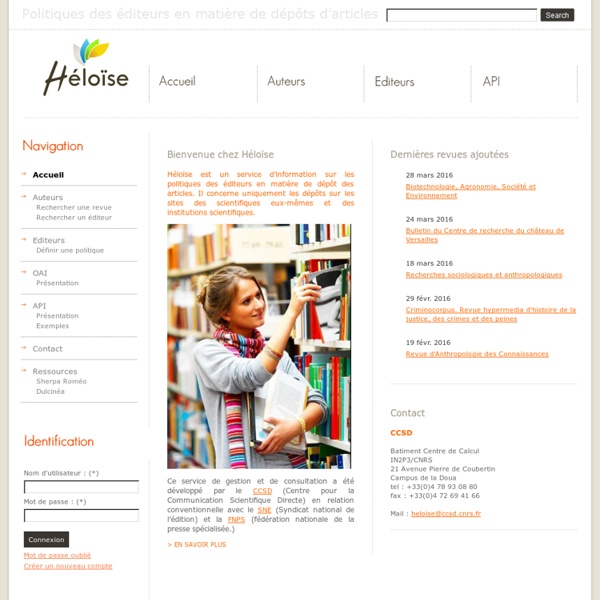13 ressources pr trouver jurisprudence en ligne
Le droit ne se limite pas aux sources écrites comme les lois et les règlements puisqu’il existe d’autres sources. Parmi celles-ci la jurisprudence occupe une place déterminante. La connaissance de la jurisprudence a été grandement facilitée avec le développement et la popularisation d’Internet. Je viens de sélectionner pour vous plusieurs ressources pour trouver de la jurisprudence étant précisé que je conçois celle-ci d’une façon très large dans le cadre de ce billet. Legifrance : le site incontournable pour rechercher des décisions de justice. Vous pouvez faire des recherches en matière judiciaire, administrative ou constitutionnelle.
MédiHAL
SavoirsCom1
Welcome to the Registry of Open Access Repositories - Registry of Open Access Repositories
SHARE is a higher education initiative whose mission is to maximize research impact by making research widely accessible, discoverable, and reusable
SHARE is a higher education initiative whose mission is to maximize research impact by making a comprehensive inventory of research widely accessible, discoverable, and reusable. To fulfill this mission SHARE is building a free, open data set about research and scholarly activities across their life cycle. By collecting, connecting, and enhancing metadata that describes research activities and outputs—from data management plans and grant proposals to preprints, journal articles, and data repository deposits—SHARE will simplify how various pieces can be identified as elements of a research project. By creating an open data set, SHARE will facilitate innovation in communication, visualization, and dissemination of information about research for the advancement of scholarship. Much of that innovation cannot be predicted in advance, and would be impossible without SHARE.
Livre blanc collaboratif sur la veille
Aujourd’hui sort un livre blanc collaboratif dédié exclusivement à la veille et la recherche d’informations : plus de 15 auteurs accompagnés d’une quinzaine d’interviews de professionnels. Le tout coordonné par Flavien Chantrel, Anne-laure Raffestin, Terry Zimmer et moi-même. Avec pour objectifs de vous faire découvrir et approfondir certaines notions clés liées à la veille.
Fiches Pratiques PKM - C. Deschamps
Arnaud Velten , concepteur des logos du modèle TIICC Gestion du Temps Le chronographe symbolise la mesure du temps. Il était primordial de représenter la notion de planification,décrire graphiquement sa maîtrise, ainsi le quart blanc symbolisant le laps de temps son début et sa fin prévue. L'aiguille nous situant (réalité objective), dans la progression, comme la boussole le fait pour contrôler notre direction.
Rédaction des références bibliographiques
Le travail de recherche et l'écriture d'un texte scientifique (mémoire, rapport, article, thèse,…) suppose une recherche d'information approfondie. Cette recherche, inscrite dans la démarche scientifique, prend directement appui sur les travaux antérieurs. L'information choisie et exploitée permet de développer une réflexion personnelle. Ainsi, chacun des documents, retenu, analysé et cité, contribue à la crédibilité scientifique du travail de recherche.
Ecole d'été "Architecture de l'information" : conférences en ligne
J'étais l'autre jour, à Lyon, invité de l'une des conférences préparatoires à l'école d'été en architecture de l'information organisée par l'université de Lyon (France) et celle de Montréal (Canada). Les liens vers les conférences sont également accessibles depuis le site de l’École d’été en architecture de l’information École d’été en architecture de l’information 2011 – Conférences enregistrées via AdobeConnect**.
150 réseaux sociaux incontournables pour un Community Manager
L'activité de tout bon community manager ne se résume pas à publier, animer, veiller, modérer sur les principaux réseaux sociaux que sont Facebook, Twitter, Google+, Linkedin, Viadeo ou YouTube. Il existe une multitude d'autres réseaux sociaux professionnels ou spécialisés qui pullulent sur la toile. Certains ont un véritable intérêt, d'autres peinent à émerger, mais il semble intéressant de s'y attarder car vous y trouverez peut être un espace pour valoriser votre entreprise, votre marque ou votre communauté. Les spécialistes SEO savent bien que créer du (bon) backlink est une nécessité pour améliorer le référencement. Ces réseaux thématiques peuvent aussi avoir de nombreux autres intérêts : s'intégrer à de nouvelles communautés déceler de nouveaux sites, partenaires, clients, … améliorer sa e-réputation en y apportant une expertise* générer du backlink sur ses supports (blog, page Facebook, ...)



